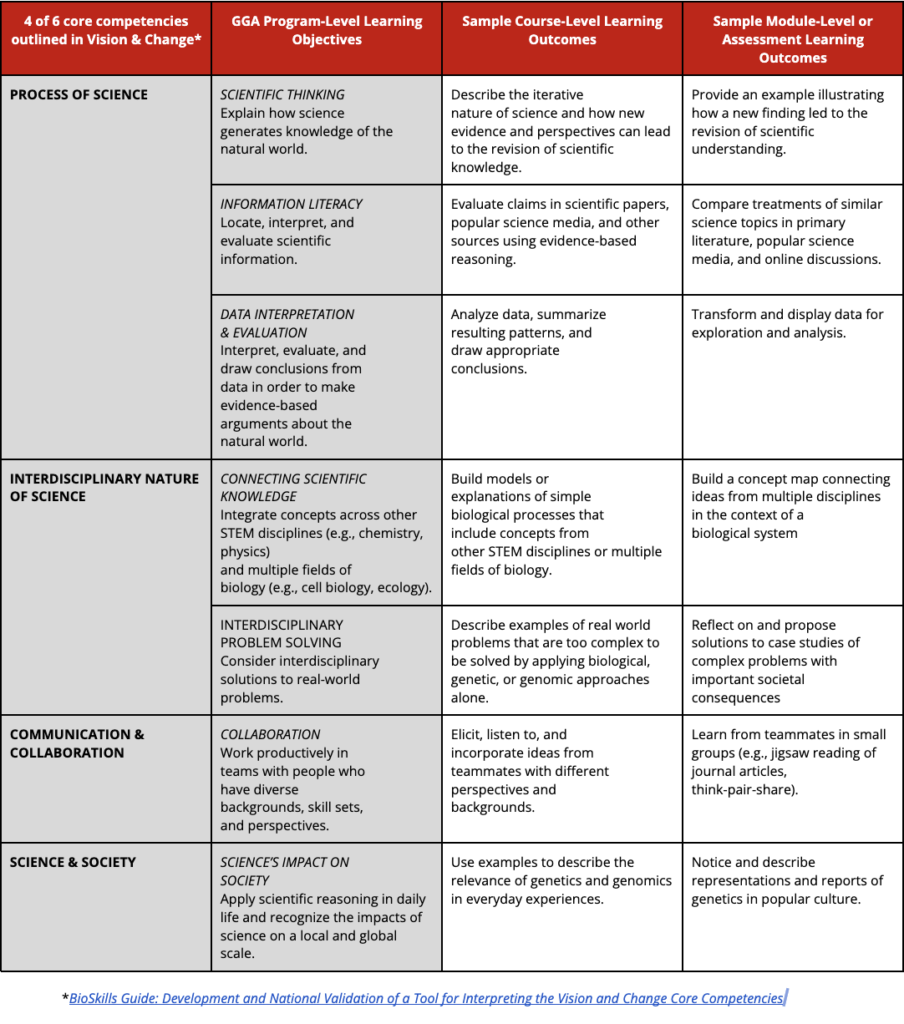GGA 1-Credit Course Development
The Genetics and Genomics Academy aims to create a series of engaging 1-credit courses in genetics and genomics, primarily designed for undergraduate students outside the life sciences. Our goal is to expose every undergraduate student to a foundational understanding of genetics and genomics, and help them appreciate the relevance of these fields in their lives, regardless of their academic backgrounds.
Course Development FAQ
Why is the GGA creating 1-credit undergraduate courses?
The academy will craft a series of engaging 1-credit courses in genetics and genomics, primarily designed for undergraduate students outside the life sciences. Our goal is to provide every undergraduate student a foundational understanding of genetics and genomics and help them appreciate the relevance of these fields in their lives, regardless of their academic backgrounds.
What is the target student population?
Our goal is to serve undergraduate students in all NC State colleges. Specific restrictions might be appropriate for certain courses. For example, a course might be restricted to first-year students, or to a specific college. We can work with you to determine what, if any, restrictions or prerequisites could be put in place.
What is the general format of a GGA 1-credit course?
GGA 1-credit courses are intentionally kept small, typically capped at 20 students. This allows for more personalized interaction with instructors and classmates. These courses should have an interdisciplinary component that encourages students to explore topics from various angles. You are encouraged to incorporate experiential learning opportunities such as field trips, laboratory tours, or hands-on activities related to the course theme. These courses should provide students practice at active participation, communication, discussion, and critical thinking. Courses should be project-based when possible, and promote revision and metacognition. High-stakes and/or timed assessments such as quizzes and exams should be avoided. The primary focus is not content delivery, but to foster curiosity and understanding of contemporary issues in genetics and genomics, while illustrating the tangible influences on our daily lives.
What are the broad areas of focus?
These courses should focus on captivating themes, designed to pique the interest of diverse student groups. Some very broad topical areas include:
- Genetic Variation and Inheritance: Understanding that genes are the fundamental units of heredity and that genetic variation and its interactions with an organism’s environment play a significant role in determining an individual’s traits. This knowledge can lead students to appreciate ways in which genetic diversity contributes to the richness of human populations.
- Genomics and Personalized Medicine: Recognizing the impact of genomics in personalized medicine and healthcare. Genomic information can help guide some medical treatments, predict disease risks, and inform lifestyle choices. Students should grasp the potential benefits, limits and ethical considerations of using genomic data in healthcare decisions.
- Ethical and Societal Implications: Appreciating the ethical and societal implications of genetics and genomics. This includes understanding issues related to genetic testing, privacy concerns, genetic discrimination, and the potential for misuse of genetic information. Students should be equipped to critically evaluate the ethical dilemmas and societal challenges associated with genetic technologies.
- Genomics and the Environment: Recognizing how genomics intersects with environmental issues, such as conservation biology and agriculture. Genomic techniques are used to study and conserve endangered species, improve crop yields, and address environmental challenges. Students should appreciate the broader applications of genomics beyond human health.
- Interdisciplinary Nature of Genomics: Acknowledging that genomics is a highly interdisciplinary field that connects with various academic disciplines, including ethics, sociology, economics, and law. This interdisciplinary perspective allows students to understand the far-reaching impact of genetics and genomics across different aspects of society and academia.
Are there specific course-level learning objectives?
Yes. GGA 1-credit courses should have course-level learning outcomes that align with the GGA program-level objectives (column 2). Samples of course-level outcomes and samples of module-level or assessment level learning outcomes are listed below in columns 3 and 4.

What is the overall time commitment?
The time required to develop and teach a new course is determined by a variety of factors. For new instructors teaching a class for the first time, this might be as much as several hours per week of preparation. For a class taught before, an experienced instructor should plan to spend 2 hours out-of-class for each hour of classroom instruction for preparation and grading.
What support can the GGA offer in the development and/or delivery of a 1-credit course?
We can help in all aspects of course development, design, and delivery! This includes but it is not limited to course topics, course learning outcomes, assessments and backward design, alignment of course activities and materials with learning outcomes, curating course materials (readings, videos, podcasts, case studies, etc.), classroom learning strategies (active learning, project-based learning, etc.), and instructional technologies (Moodle, Google apps, Yellowdig, TopHat, etc.).
Are there other incentives?
The GGA offers a $4,000 financial incentive to the instructor for course development and delivery. The instructor may choose to allocate those funds as they choose. For example, if an instructor is co-teaching with a postdoc, they could choose to split those funds.
How can I propose a course?
Please complete this google form and someone will be in touch with you!
For additional questions, please email Melissa Ramirez (mvramire@ncsu.edu).